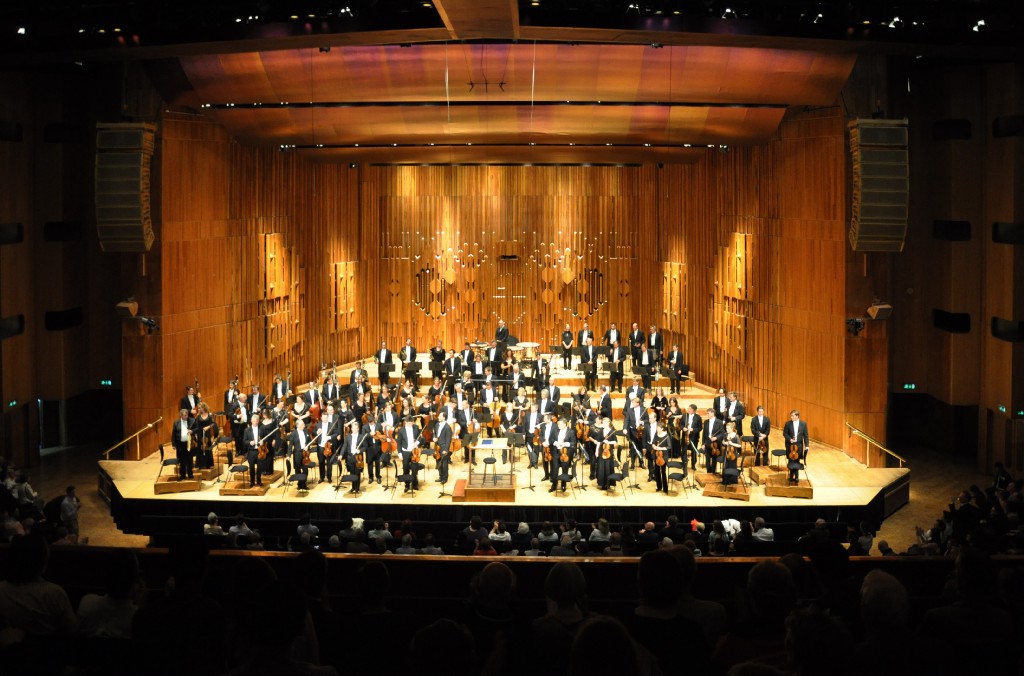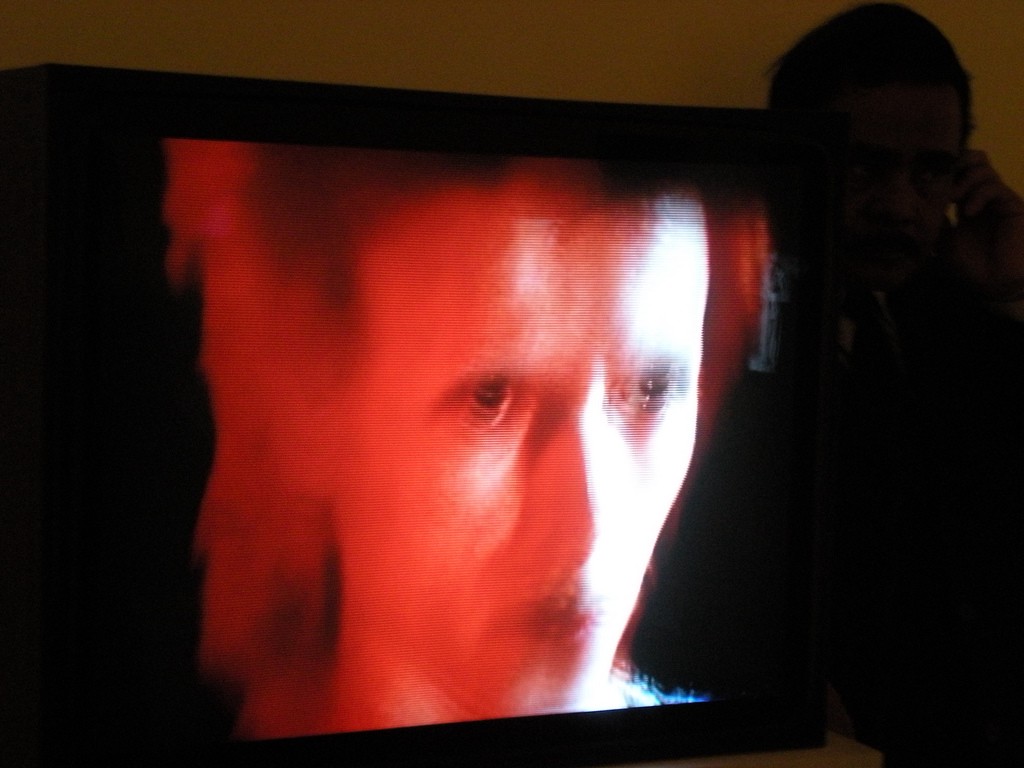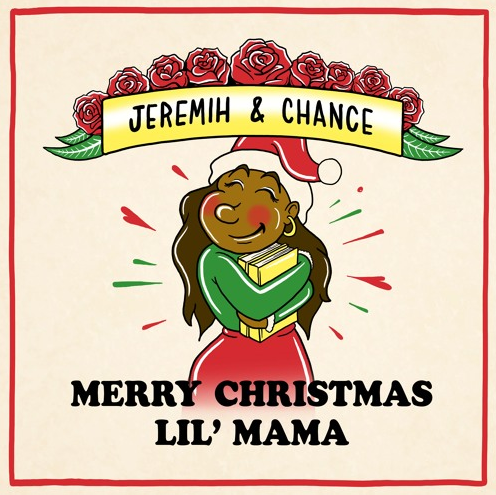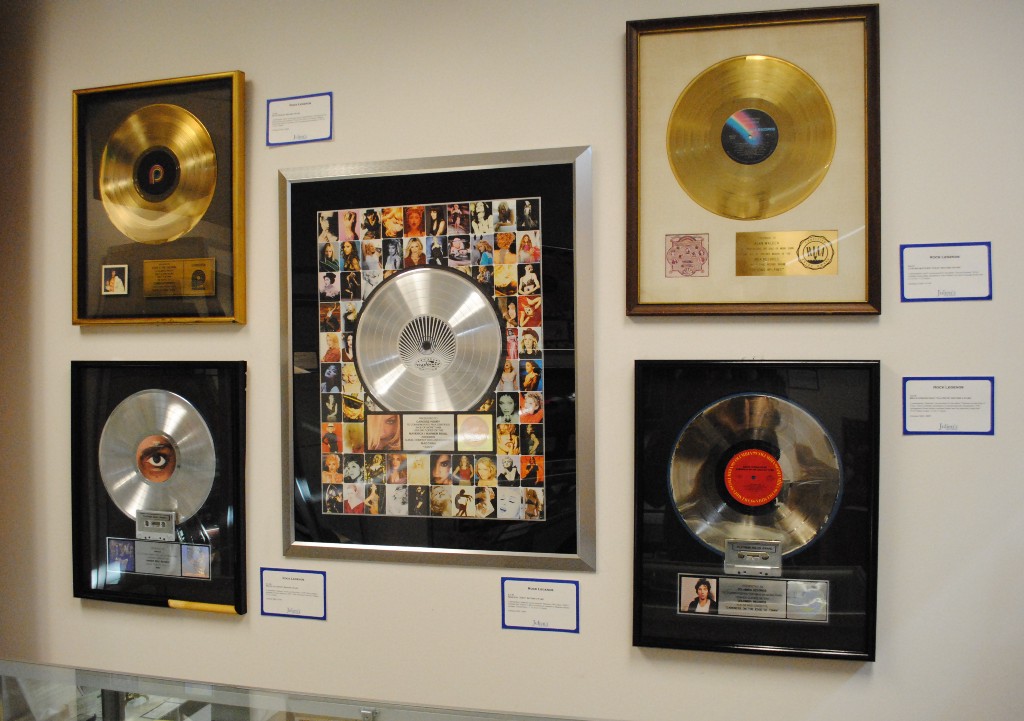Live from London, it's Mozart and Tchaikovsky
Classical Music Hour with Fran

Last week, I was winding down a week-long trip to London, and on my very last night, I decided to take myself to see the London Symphony Orchestra. The program was as follows: Mozart’s Violin Concerto №1 in B-flat major K207 and Violin Concerto №4 in D major K218, and Tchaikovsky’s Fourth Symphony. I had so much fun and drank too much wine at the intermission (“the interval”).
First thing, of course, obviously, is that if you are lucky enough to live in a city with a symphony orchestra, you should go! Even if you aren’t fully familiar with what’s on the program. I was really only familiar with the Tchaikovsky, in this case, but it’s a good way to hear new pieces you wouldn’t necessarily seek out on your own. If you research your local symphony orchestra, often you can get cheaper seats with obstructed views or far back or something. This isn’t… great? But while seeing the symphony in motion is wonderful and good — being able to hear classical music live is a very special treat.
It’s likely you’ve noticed I haven’t gotten to Mozart yet in this column, in part because there’s just so much to get to and in part because he’s a tricky person to cover. I mean, we’ve all seen Amadeus by now, right? Mozart was a teen superstar back in his day. For example, he wrote his Violin Concerto №1 when he was 17. THIS IS SOME TEEN MUSIC IF I EVER HEARD IT.
I quite like this recording by the Prague Chamber Orchestra from 1991 that has both concertos in it. The Violin Concerto №1, my London Symphony Orchestra program tells me, is somewhat formal and straightforward. I certainly don’t disagree with that. While I like Mozart as much as the next person with ears, even in his less formal works, there’s a kind of mechanical nature to everything. Still, though: it’s upbeat and cheerful. When you listen to Mozart, it’s impossible not to feel very instantly transported to some 18th-century manor, traversing a garden.
In the Violin Concerto №4, Mozart is clearly coming into his own. I mean, he was 19 when this one was completed so, he was like… a hot teen? Or something close to it. The final movement of the Violin Concerto №4 is a “Rondo,” and this third movement is one of the most popular ones of all time. A typical rondo is formed up of a principal melody and then interrupting episodes or alternative melodies. There are two main ones here in the Violin Concerto №4. It’s almost like whenever you get comfortable with one melody, Mozart switches it up on you like a big prank, which, you know, is very late teen of him.
And then there was the Tchaikovsky… Since last time, I have so much more to say.
Tchaikovsky Is The King Of Melody
Tchaikovsky’s Fourth Symphony doesn’t have quite as rigid of a formal melody as the Fifth Symphony does but it’s a wide-reaching, colorful, and surprisingly deep piece of music. Please enjoy this 1989 recording of the Chicago Symphony Orchestra playing it. It’s very likely that this particular symphony feels more like a complete emotional piece of work because it was composed during one of the more tumultuous points of his life. I want to mention here that all of my Tchaikovsky information and anecdotes come from this Anthony Holden biography of Tchaikovsky that I am currently reading. It’s very good and I would recommend it and probably won’t stop talking about it for years.
It is now (and was then) widely known that Tchaikovsky was gay. The year he started working on this symphony, however, he married a woman named Antonina Miliukova because… she wrote him a fan letter? That’s how they met, at least. Tchaikovsky was desperate to get rumors of his homosexuality out of the streets and figured the best way to do this was to marry a self-proclaimed fan, but this backfired for multiple reasons. First and foremost, he hated being married to a woman! Tchaikovsky wasn’t attracted to her and couldn’t stand her and had a bad time all the time. Second, he later found out she didn’t know… any of his music…? Look, one time I went to a Muse concert with a slightly cooler high school friend and just pretended to know all the words. YOU GOTTA FAKE THAT KIND OF STUFF. Tchaikovsky wound up getting out of his marriage in less than six months, but the whole thing was stressful and exhausting and sent him more or less on the run through Europe to escape all sorts of rumors about him.
It’s this stress, I believe, that fuels the first two movements of the Fourth Symphony. Both the “Andante sostenuto” (meaning “sustained slowness”… yikes) and the “Andantino in modo di canzona” (meaning something close to “slow but like a song”) have these resigned, mourning tones to them. They’re laments. They sound like these overarching pangs of grief and guilt that Tchaikovsky must have felt for throwing his life in such disarray that year.
Coinciding with his failed marriage, however, was a very interesting, and quite frankly, straight-up fucking weird, relationship with an older widow named Nadezhda von Meck, who became Tchaikovsky’s main patron and best friend and significant pen pal for several years. The Fourth Symphony is dedicated to her; in fact, it says: “Dedicated to my best friend.” Which is sweet, mostly, although again: there was much strangeness between them. She was an older widow and very much in love with the idea of Tchaikovsky, but also knew herself well enough to never ever meet him (please take notice if you, like me, have gone through some failed Twitter crushes).
Tchaikovsky, too, was uninterested in meeting von Meck, namely because he didn’t want another woman who was a big fan to lure him into anything, so the two kept their distance. Except, sometimes not? Very often, von Meck would invite Tchaikovsky to her estate to write for a while, where he did a fair amount of work on this symphony. She would then create detailed schedules and drop it off at his door every morning so he knew where not to go so they wouldn’t ever see each other. They did shit like this FOR YEARS. They saw each other ONCE on ACCIDENT and Tchaikovsky said it was the most EMBARRASSING moment of his WHOLE LIFE which I DOUBT but STILL.
The last two movements of the Fourth Symphony are particular favorites of mine. The “Scherzo” has this really fun pizzicato throughout; it gives the whole thing a very playful feel. It’s drastically different than the first two movements, as if Tchaikovsky was finally pulling himself out of the funk he had gotten himself into in his No Good Very Bad 1877. I mean, you listen to the 2:20 mark and tell me that isn’t jovial as shit.
And then! The final movement, the “Allegro con fuoco,” (quickly! With fire!) is its own grandiose piece of music. Here’s a true thing: I listened to this movement and thought, “hm… this is very familiar, and soundsexactly like Dario Marianelli’s very good score for the 2012 film Anna Karenina.” For what it’s worth, I think this is one of the best scores of all time, but it does use this “Allegro con fuoco” pretty frequently throughout.
BUT THEN I learned that it was Tchaikovsky himself who was inspired by Tolstoy back in the 18th century, and this particular movement has been used to score multiple adaptations of the novel. Good God!!!
(The other anecdote I have about Tchaikovsky and writers is that he met Dostoevsky once and said he spent the whole evening “talking of complete rubbish, as literary men do about music.” !!!!!!!!!!!!!!!!)
This is giving a lot of weight, I know, to both Mozart and Tchaikovsky, but it’s the final Classical Music Hour of the year. Hopefully this gives you plenty to listen to over the holidays on top, of course, of the requisite Nutcracker ballet. Until 2017!
Fran Hoepfner is a writer from Chicago. You can find a corresponding playlist for all of the pieces discussed in this column here.
Some Are Winter Sun
More thoughts on David Bowie

No matter what your feeling about David Bowie and his work — whether you like all of it, or only love bits of it, or are determined to collect every last thing — it was impossible for his death last January not to feel like some kind of marker. The 20th century was the age of the frontline news photo, the water-cooler TV moment, the must-have LP, but all those heat-of-the-moment things have been demoted or disappeared in our new century’s digital realignment. In our current post-everything age, Bowie’s death was another reminder of how times have changed.… Maybe one of the reasons the 1970s were such an incredibly creative time is that we weren’t all reading biographies and blogs and tweets about (or even by) our heroes, who in turn weren’t thinking about the best way to ‘grow their brand’ exponentially through a social media arc. All that unmediated space waiting to be filled!
You might not be able to read anything else about David Bowie and if that is the case it’s okay. Don’t feel bad about it. There was a lot to read about David Bowie over the last year and now that the year is ending there is a lot about David Bowie to read again. No one should feel as if they need to read anything more about David Bowie. But if you are someone who can read one more thing about David Bowie this is probably what it should be. Or you can just go listen to Low.
A Poem by Timothy Liu
Leda and the Swan
A suicide bomber detonates in the marketplace. No one I know.
Put on some Roberta Flack.
He won the Pulitzer. For the second time. A third. Touch the spines of your cloth editions, sniff the pages. Everything is limited.
The oil fields of Kuwait. Trickle-down economics. The price of crude.
He won the Nobel. No one you know.
A suicide bomber detonates in the marketplace. A second time. A third. Trickle-down economics.
I dreamed the signed editions I bought online each had an inscription made out to me. Before I was born.
Seems it took a long time for the reports to get here, for the words to sink in, everything ahead of their time.
Her name was Roberta. Roberta Frost. What a drag. Gender bending her ass across a granite countertop till her man gushed pearl. The price of crude.
The illiteracy rate, state by state. Who’s on top, bottom. Everything trickles down in the marketplace where a suicide bomber fails to detonate.
Seems it took a long time for your man to get off. What a drag. Wig askew.
Her name was Roberta Frost. No one I know.
Meet me in the oil fields of Kuwait. Before we were born.
I dreamed I was giving an acceptance speech in the hallowed halls of a dank and lowly edifice, suicide vest bulging underneath my puffy coat. April is the cruelest month.
What will it be this time, a grande chai latte or a venti mocha topped with whipped cream? Your name? Roberta. No soy.
He was gushing pearl. A second time. A third. We even exchanged places, state by state, a top to bottom trickle-down economics.
Meet me on a granite countertop. Put on some Roberta Flack. Undo the clasps of my suicide bra.
The MacArthurs I bought online each had inscriptions on them, words I knew I’d forget the minute I woke. The price of crude. Genius.
My father gushing pearl, sending a tremor through my mother’s marketplace. Before I was born.
Remember scratch and sniff? Remember mad libs? Remember growing your very own Chia pet in the dark recesses of your desk at school while someone else droned on: “And miles to go before I sleep.”
Change or repeat / change or repeat / change or
This is an illiteracy test of the emergency broadcast system. Had there been an actual emergency . . .
What a drag. Waking up. Going out of this life in a cloud of puffy down when my suicide bra went off.
Timothy Liu’s latest book is Don’t Go Back To Sleep. He lives in Manhattan and Woodstock, NY.
The Poetry Section is edited by Mark Bibbins.
Have a Nice Day
The Adventures of Liana Finck

Liana Finck is a New Yorker cartoonist and graphic novelist. She posts autobiographical cartoons on Instagram.
Give Yourself The Gift of Chance
Chance the Rapper dropped a mixtape in the middle of the night.

In the wee hours of Thursday morning, Chance the Rapper nonchalantly tweeted a pretty huge gift for his fans: a Christmas mixtape he collaborated on with Jeremih, featuring appearances from Noname and Hannibal Buress.
He already has one of the biggest albums of the year with his seven-time-Grammy-nominated Coloring Book mixtape, and that only dropped over the Summer—so Chance is by no means overdue for a full-length release—yet here we are with nine brand new wintery songs that are also silly and fun to listen to. It’s like Santa is real and he has a Soundcloud account:
“Fuck 2016,” they repeat on behalf of everyone in “I Shoulda Left You.”
“Hey lil’ mama let me bang / Happy birthday Jesus,” they sing back-to-back to their crush, just like you do, on “Merry Christmas Lil Mama.”
During a holiday season where it might be easy for the cheeriness to get washed out by… everything else that’s going on, this mixtape is like a hug. Be the girl in the cover art. You are her.
Max Cooper, "Order From Chaos"
We’re so close.

You can feel it, right? You may be limping to the finish line but you will not have to drag your ass along all that much farther now. If you are not on auto-pilot already you are at the very least like one of those sea creatures whose brain is partially asleep at all moments. If you are an anticipation-is-better-than-the-actual-event type this is the greatest time of year for you, and if you’re someone who just can’t wait for the whole fucking thing to be over these are the most tantalizing two days on the calendar. I hope you appreciate them, because what comes after is going to be a nonstop drag.
Anyway, Max Cooper says of this song and its accompanying video:
[T]he rhythm of the track is created by the raindrops in an emergent manner — I took the audio samples, mapped the transients for the raindrop hits, and then forced the mapped points towards the nearest drumming grid positions. This meant that the random raindrops were pushed into a quantised grid, and the result was that a percussive rhythm emerged, one that I hadn’t created myself, but was the closest rhythm to that particular section of rain.
I then played the sansula over this rain rhythm, and added lots of pads and saturation layers, finally with some vocal snippets from Kathrin deBoer to complete the track. Maxime Causeret selected this track to work with, under the brief to map the emergent rhythm to an exploration of emergence in living form.
What does that mean? Fuck if I know. I’m a moron. All I know is what sounds good, and this is definitely that, plus the video is cool. Enjoy! You’re almost there!
New York City, December 20, 2016

★★★★ Vent plumes, sunlit to brilliance, were the only cloudlike things in the astringently clear sky. A man walked a trio of tan dogs, two large and one small, so immaculately fluffy against the cold they must have been freshly washed and dried. The sun went glancing off things and caught a haze; a vast glowing nimbus preceded it as parallax carried it out from behind a building. The overheating indoors, with the outdoor gear still on, manifested itself down at the soles of the socks. First a downtown crosswalk sign was unreadable because of the glare surrounding it, and then an uptown sign was unreadable because of the glare off its face. A tall plywood construction wall, painted blank green, gleamed so the grain of it took on frantic, near-legible patterns.
Letting Kids Use Social Media Is One More Way We Show Them We Don't Care About Them
Why did we think this was a good idea for anybody?

Science, tell us what else is terrible in the world right now.
Young adults who use seven to 11 social media platforms are three times more likely to suffer from depression and anxiety than those who use zero to two platforms, according to a new study by researchers at the University of Pittsburgh Center for Research on Media, Technology and Health (CRMTH)…. One suggestion is that users of multiple platforms would be constantly multitasking — as would happen when switching between platforms — which is strongly linked to poor cognitive and mental health outcomes. Also, they note that there is greater opportunity to commit a social media faux pas when using multiple platforms, which can lead to repeated embarrassments.
Think about how hard your own adolescence was. Think about how close to crazy you came with almost nothing else to do. Now imagine how horribly you would fuck things up with so many social platforms demanding your attention and reminding you of how worthless you are all the time. Look at how many adults you know who are handling it badly! (Before you get all judgey about kids being on so many platforms, here are the ones they asked about: Facebook, YouTube, Twitter, Google Plus, Instagram, Snapchat, Reddit, Tumblr, Pinterest, Vine, and LinkedIn. How many were you on this week?) It’s a probably a good thing that these children have no future, because the world to which they would have grown up would be so terrible they’d have been right to hunt down those of us responsible and murder us for likes.
Octopuses Are Basically Aliens On Earth
It’s the movie ‘Arrival’ come to life.

It’s firmly established that octopuses are smart: they’re difficult research subjects because they destroy equipment and squirt the scientists; they escape from aquariums; they defend themselves with rocks. But their sentience has always been questioned. As humans we understand our own complex brains and can observe similarities between ourselves and say, the apes, but could it be possible that evolution on our planet generated sentient minds twice over, in two separate prongs of the animal kingdom? According to a new book from scuba-diving philosopher Peter Godfrey-Smith, it seems like the answer is “probably”:
The most-recent common ancestors of humans and octopuses lived about 600 million years ago, early in the evolution of animal life. Although much about our joint ancestors is obscure, they were probably small wormlike creatures that lived in the sea. This makes octopuses very different from other animals we suspect of sentience, such as dolphins and dogs, parrots and crows, which are much more closely related to us.
But the intelligence of an octopus relative is a little less apparent to the human mind. Squid, cuttlefish, sea snails — they’re not necessarily the first names on the board when you’re listing complex beings capable of self-reflection. That doesn’t mean they’re not intelligent though, it just means that a cephalopod brain might not respond to the same kinds of IQ tasks a human brain does. We might not be testing them in the right language yet.
According to New York magazine’s Science of Us blog:
Why would tasks that measure human cognition be relevant for cephalopod thinking? …Because of the vastly different evolutionary histories, and the environment the animal has had to find fitness in, octopus intelligence is likely structured in a very different way from a human’s… And in trying to assess their intelligence, science is likely going to have to re-frame its understanding of human smarts, too.
If what he’s suggesting is starting to sound like the 2016 blockbuster Amy Adams vehicle Arrival, it’s because it essentially is. Only instead of spaceships we’re dealing with these other animals living on our planet simultaneously.
“If we can make contact with cephalopods as sentient beings, it is not because of a shared history, not because of kinship, but because evolution built minds twice over,” Godfrey-Smith says. “This is probably the closest we will come to meeting an intelligent alien.”
Dang.
Soundscan Surprises, Hanukkah Edition
Back-catalog sales numbers of note from Nielsen SoundScan.

The definition of “back catalog” is: “at least 18 months old, have fallen below №100 on the Billboard 200 and do not have an active single on our radio.”
As we discussed last week, the War on Christmas is a made-up thing that does not show up anywhere on the Billboard Back Catalog. You know what there is a war on, though? Hanukkah. And it’s been going on forever. There is basically never not a war on the Jews going on, particularly during holiday shopping season. In honor of of their neverending plight, I have picked out a few notable Jews on the back catalog this week. Some of these may be surprises to you, like Elvis for example, is a Halakhic Jew—in heritage if not in practice. Same with Lars Ulrich, believe it or not, but Metallica doesn’t need the attention so I left them off. Idina Menzel says she celebrates both Christmas and Hanukkah, and embodies the classic “I just wanted to sing those great songs too” in her 2014 holiday album, Holiday Wishes. Miles Davis is an honorary member of the tribe, among other reasons because without fail, every nice young Jewish man I ever met at college had this album in his iTunes library.
58. WINEHOUSE*AMY BACK TO BLACK 3,810 copies
69. PRESLEY*ELVIS HE TOUCHED ME 3,501 copies
75. MENZEL*IDINA HOLIDAY WISHES 3,175 copies
77. DIAMOND*NEIL ALL TIME GREATEST HITS 3,147 copies
96. DAVIS*MILES KIND OF BLUE 2,873 copies
108. COHEN*LEONARD ESSENTIAL LEONARD COHEN 2,639 copies
132. SIMON & GARFUNKEL GREATEST HITS 2,316 copies
(Previously.)
